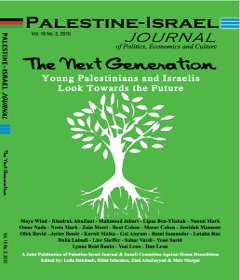"St Augustine said, 'An unjust law is no law at all.' Which means I have a right, even a duty to resist. With violence or civil disobedience. You should pray I choose the latter."
So ends a speech of a young James Farmer, who would grow up to be a leader of the American civil rights movement.
The speech claims that where there is no justice, no equality and the laws themselves are unjust, there is nothing more natural and legitimate than the struggle, be it a violent or non-violent one, as would any freedom fighter say. The bottom line is that the oppressors should pray the oppressed choose civil disobedience over an armed struggle.
The seeds of the third intifada were sown the moment the second one failed, and there is no doubt the Palestinian struggle for peace will continue and grow until, one way or another, it is victorious. That is the nature of struggles for freedom; they are painful and bloody and leave scars that will never heal, but they succeed.
For years, we, the Israeli society, have criticized Palestinian resistance to the occupation and used Palestinian violence as an excuse to maintain and strengthen our control. In doing so, we blame Palestinians for the continuation of the occupation and thus absolve ourselves of any responsibility.
A New Kind of ResistanceBut what do we say when a new kind of resistance emerges? A new voice of resistance to the occupation, a voice that refuses to be only Palestinian or only Israeli and instead demands a joint struggle? An unarmed voice that has cost the lives of people fighting for it but has never taken a single life of those who oppress it? A voice of civil disobedience - an alternative to the violent resistance that existed up until today, an alternative that we, as oppressors, should pray the oppressed choose.
Muhammad Khateeb, a prominent figure in the joint non-violent popular struggle against the occupation, called things as he saw them. He gave an interview that declared the non-violent demonstrations against the occupation emerging around the West Bank as the beginning of the third intifada: an unarmed intifada that breaks the old borders of who is "us" and who is "them," and that enjoys the support of the international community in statements, funding and the growing adoption of a call for BDS (Boycott, Divestment and Sanctions). A few hours after the interview was published, on January 28, 2010, Khateeb was arrested and taken from his home in the middle of the night.
Khateeb is not the first and will definitely not be the last person to pay a price for his struggle. The Israeli government and army have spared no means in trying to suppress this struggle. They have used arrests, night raids on villages, closures and sieges on villages, "sound bombs," tear gas, rubber bullets and live ammunition, costing the lives of 13 non-violent demonstrators.
It would seem there is no sense in this aggression. The notion of suppressing with violent force a struggle which will never hurt the average Israeli and which will be only felt when it succeeds in ending this conflict defies logic. Why should we send an army to suppress a group of protesters carrying signs and chanting that endangers no one and appears as an alternative to the violent resistance that we were once a victim of?
The Intifada That Will SucceedThe answer is simple - this is the intifada that will succeed.
A struggle that undermines Israel's usual excuses that "they" are the aggressors and "we" are the victims; an intifada that is embraced by the international community, the suppression of which screams from the television sets of the world; an intifada that has the support of Israelis as well as Palestinians; an intifada that is rooted in a long tradition of nonviolent struggles for freedom and equality; an intifada that James Farmer would have been a part of - as am I.

